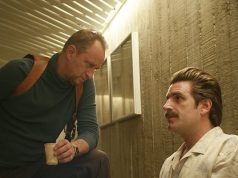The first moments of “Amores Perros” are frantic and chaotic as two men drive wildly through heavy traffic with a bleeding dog in their backseat and a pickup truck carrying a man with a gun pursuing them.
The scene ends with a bone-crunching car wreck, and then the movie REALLY begins, showing us the lives of several different people who all have a connection to that accident.
“Octavio y Susana” is the on-screen title of the first segment, which shows us what led to the high-speed chase. Octavio (Gael Garcia Bernal), the car’s driver, is a sweet, directionless young man living with his brother Ramiro (Marco Perez) and Ramiro’s wife, the fetching Susana (Vanessa Bauche). Ramiro is violent and unpleasant, working part-time at a grocery store and spending his evenings robbing convenience stores. There is no love lost between the brothers, and the tension in that small apartment is palpable.
Octavio is not-too-secretly in love with his sister-in-law, and certainly treats Susana better than Ramiro does. When she gets pregnant, she realizes she doesn’t want to be stuck with Ramiro anymore, and she finally consents to run off with Octavio.
But how to get out of town? They’ll need money. Ramiro and Octavio have a brutish dog called Cofi who turns out to be a champion at ripping other canines’ throats out, and Octavio makes money on the underground dog-fighting circuit.
He also runs afoul of a dog owner whose animals keep getting destroyed by Cofi, which is what leads to the car chase.
But who was in the car that Octavio wound up running into? That’s the subject of the next segment, “Daniel y Valeria,” which, instead of showing us what led to the accident, gives us only a brief backstory and then focuses on the aftermath.
Valeria (Goya Toledo) is a successful model carrying on a secret affair with a married man named Daniel (Alvaro Guerrero). He leaves his wife and they get an apartment together, just in time for the accident, which leaves her right leg shattered. Their romantic, exciting life together is slapped into reality as Daniel is faced with the daily chores of helping Valeria get around, and as Valeria herself must deal with being scarred and unable to work anymore.
The last chunk is called “El Chivo y Maru,” and it focuses on a disheveled old man who can be seen in the periphery in the other stories. El Chivo (Emilio Echevarria) was once a guerilla who now occasionally does murder-for-hire work. He lives with his dogs in an old shack and secretly pines for his estranged daughter, who doesn’t know he’s alive.
The title of the film is translated as “Love’s a Bitch,” though “perros” also has the innocuous meaning of “dogs,” which also works. Every story has dogs acting as catalysts for the major action: Octavio’s dog helps him raise money to run off with Susana; Valeria and Daniel fight over her yappy terrier that gets stuck under the floorboards of the house; El Chivo’s dogs suffer at the hand — er, paw — of another.
It’s ultimately rather hopeful, but the film is drenched in cynicism, as you might expect with a title like “Love’s a Bitch.” As El Chivo puts it, “To make God laugh, tell him your plans.” Everything goes wrong, and nothing turns out the way we expected. It’s enough to make you laugh — which the film often does. Ironic twists and painful discoveries are usually laughably heartbreaking.
First-time director Alejandro Gonzalez Iñarritu has an astonishing visceral sensibility; the word “gritty” was invented for this film, particularly in Octavio’s story, where you can practically feel the grime and filth wash over everything. (The second story focuses on people of a higher social class, where it’s their souls that are dirty, not their surroundings.) Hand-held cameras and bleached-out colors remind one of that other recent Mexico-based gritty film, “Traffic.”
Kudos also to screenwriter Guillermo Arriaga, who has developed a crackerjack tale full of good old-fashioned storytelling. It’s rare to see a movie so unabashedly plot-heavy and intricate, and the narrative style is fantastic. The non-linear storytelling and intersecting plots are nice, but I’m more impressed with the way characters creep in unexpectedly and in a way that makes you wait patiently to find out how they fit.
The first story, for example, while focusing on Octavio and Susana, also shows intriguing glimpses of El Chivo and Daniel — without explaining who they are or why we should pay attention to them. But the sheer force of the characters is so strong that we pay attention anyway.
Strong, dignified acting is the rule here. One feels respect for these people regardless of whether they deserve it, because even the scoundrels are portrayed with humanity. For as cynical as “Amores Perros” can be, it has an underlying warmth that elevates it to greatness.
A (; )





